Digital pathology breaks down geographical barriers and brings together experts via the virtual world

Until the advent of digital pathology in India, histological slides and photographs were the primary tools to share microscopic images with others. Which brings us to the question of what exactly is digital pathology and does India need it? From simply remotely viewing patient slides, to consulting specialists real time within India and other parts of the world – the applications of digital pathology are endless.
Digital pathology eliminates some of the issues associated with sharing slides such as the degradation of samples and inability to share them. In addition to preserving quality, specimen images can be transferred to colleagues with ease. It also plays a significant role in diagnostics as hospitals and laboratories can share images anywhere in the world, thereby significantly decreasing the time it takes to diagnose and treat a patient. In addition, using networking tools, multiple pathologists can assure that teams are discussing the same aspect of the sample. Digital pathology breaks down geographical barriers and brings together experts via the virtual world and eliminates the need for expensive logistics to bridge that distance. In rural areas especially, this has opened new window as patients can now access experts sitting anywhere in the world.
Bu hikaye Healthcare Radius dergisinin December 2017 sayısından alınmıştır.
Start your 7-day Magzter GOLD free trial to access thousands of curated premium stories, and 9,000+ magazines and newspapers.
Already a subscriber ? Giriş Yap
Bu hikaye Healthcare Radius dergisinin December 2017 sayısından alınmıştır.
Start your 7-day Magzter GOLD free trial to access thousands of curated premium stories, and 9,000+ magazines and newspapers.
Already a subscriber? Giriş Yap
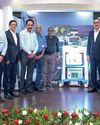
KIMSHEALTH launches electrophysiology lab with 3D mapping
'ENSITE X' is the first of its kind in Kerala and the third in India enabling precise identification, mapping, and targeting the abnormal electrical activities in the heart.
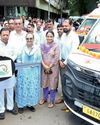
Molbio boosts Goa's healthcare system with CSR initiatives
The company has donated four state-of-the-art Advanced Life Support (ALS) ambulances and two hearse vans for National Highway emergencies

USV introduces affordable heart failure medication
This cost-effective option addresses the rising cases of heart failure in India, offering lifesaving care to millions of patients who need it the most.
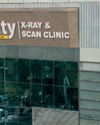
City Imaging & Clinical Labs to expand services to 50 hospitals
The company is currently associated with 10 hospitals, providing comprehensive lab management services, including 24/7 in-house phlebotomy and lab testing.
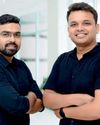
Oncare raises $1 million in seed funding, to set up 10 units
Oncare has raised $1 million in a seed funding round led by Huddle Ventures. It plans to deploy the raised capital to expand its operations to 10 new centers.

Nutrabay forays into Ayurvedic supplements market with Shilajit
Nutrabay's aims at gaining market share from the existing ayurveda supplements market with a distinctive product proposition and education about the benefits of Shilajit.
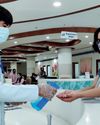
INDIA'S PREPAREDNESS ON HEALTHCARE-ASSOCIATED INFECTIONS: A GROWING FOCUS ON PATIENT SAFETY
The country's diverse healthcare landscape necessitates a flexible and multifaceted approach to infection control that can be adapted to various settings and resource levels.
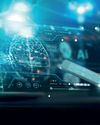
TRANSFORMING CARDIAC SURGERY: HOW AI IS REVOLUTIONIZING PATIENT CARE AND OUTCOMES
Dr. Swarup Swaraj Pal shared his insights on the current state and future prospects of AI in cardiac procedures.

BEYOND THE LAB: THE CRITICAL ROLE OF LOGISTICS IN INDIA'S PHARMACEUTICAL INDUSTRY
As India continues to expand its role in the global pharmaceutical market, the importance of a robust, reliable, and innovative logistics infrastructure cannot be overstated.

LIFESTYLE DISEASES IN CHILDREN: A WAKE-UP CALL FOR A HEALTHIER GENERATION
In today's fast-paced world, children face an unexpected enemy: lifestyle diseases. Conditions like obesity, Type 2 diabetes, and hypertension are now affecting our youth. What's causing this shift, and how can we combat it?